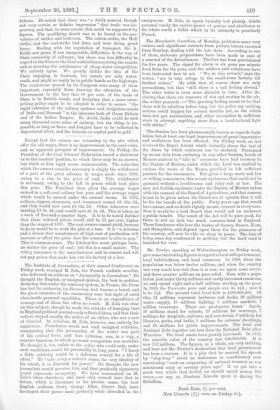Except that the miners are returning to the pits which
offer the old wages, there is no improvement in the coal-crisis, and no apparent prospect of improvement. On Friday, the President of the Coal Owners' Federation issued a statement as to the masters' position, to which there may be an answer, but which at first sight seems unanswerable. The reduction which the owners consider necessary is simply the withdrawal of a part of the great advance in wages made since 1888, owing to a rise in the price of coal. This withdrawal is necessary, owing to the fall in prices which took place this year, The President then gives the average wages earned in a soft-coal colliery last year, and the average wages which would be earned under the owners' terms. In. 1892, colliers, rippers, stone men, and trammers earned 21 19s. 2d., and they would now earn 21 12s. 2d. Other labourers were earning 21 8s. 4d., and would earn 21 3s. 4d. This is taken on a week of five-and-a.quarter days. It is to be noted further that these reduced prices would still be 15 per cent, higher than the wages of 1888. The coal-owners cannot yield, because to do so would be to work the pits at a loss. It is "a delusion and a dream that maintenance of high cost of production will increase or affect the price that the consumer is able to pay." This is common-sense. The kitchen-fire must perhaps burn, no matter the price of coal ; but this is a small matter. The ruling consumer is the manufacturer, and he cannot and will not pay prices that make him run his factory at a loss.


































 Previous page
Previous page